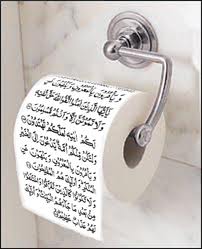As anybody who is a regular reader of this blog will understand, I have immense respect for ex Muslims. I respect their strength of character to leave an ideological path that enforces its view not just with social pressure but often with violence.
It is the existence of ex Muslims and questioning Muslims why I try not to classify all Muslims as a monolithic group. Whilst I have few qualms about calling the ideology of Islam itself, evil, that description does not fit all those from an Islamic background. The Islamic community contains not only those who hate us and want to kill us, but also those Muslims who believe that Islam can be reformed and those who want to leave Islam. These questioning and rejecting Muslims all too often are forced to stay within Islam due to the prospect of communal violence being aimed towards them. They may want to leave, may want to voice their questions, but find that they cannot.
Those Muslims who do leave Islam or at least leave behind the worst aspects of Islam as well as freeing themselves from Islam, also provide a valuable insight into the Islamic mindset and into Islamic theology. Ex Muslims, and especially religiously well educated ones, can help to reveal to the world those aspects of Islam that make it such a problem for other societies and indeed a threat to such societies. Ex Muslims can also help to counter views about Islamic theology in the non Muslim world that many may accept without question. One view that one ex-Muslim, Apostate Prophet, has dealt with in a video is the issue of Islamic monotheism.
The video, embedded below, shows Apostate Prophet, a favourite ex Muslim of mine, speaking of the nature of Mohammed and the difference between Mohammed and the Christian’s Jesus character and the Jewish prophets. What Apostate Prophet has pointed out is that the position of Mohammed is very different from the position of Jesus in Christianity and Moses for example in the Jewish Torah. The way that each religion treats their primary human or humanoid character is markedly different. In Judaism, although Moses is revered as a great religious teacher and leader, it is recognised that he was a mortal man and a flawed one at that. Jews are not commanded to be great like Moses, but only to make the best of ones abilities and life. Moses occupies no especial level of reverence that puts him as an equal of the Jewish deity.
With Christianity, the central humanoid character, Jesus, is not completely of the physical world. He was not, according to Christians a mortal man. Modern Christians believe that Jesus was their deity’s representative on earth and to the deity he returned. According to Christians Jesus was not like Moses a mortal and flawed man who was born and who died and was buried. Therefore Christians revere Jesus on a par with the deity as one of a Trinity of Father, Son and Holy Spirit.
Both Christianity and Judaism are plainly monotheisms. In Judaism no human is allowed to be worshipped as a deity and in Christianity the humanoid figure is not human but part of the deity. Despite different approaches to the relationship between humans and the deity, neither faith has any position for the exceptional reverence of one human individual. Yes the Catholic Church and some other churches have Saints, but these Saints are not seen as the equal of the deity but subordinate to it.
This is where Islam differs from what I would call the true monotheistic religions of Judaism and Christianity. As Apostate Prophet said both Christianity and Judaism have their focus on the deity not on any mortal man. He said that the position of Mohammed in Islam makes no sense for a monotheistic religion and distracts from the worship of the deity. Apostate Prophet makes the very valid point that Mohammed cannot be seen as the ‘perfect man’ to be emulated, followed and protected from insult as he was not in possession of a fraction of the knowledge possessed by the average person today.
After watching Apostate Prophet’s video on the place of Mohammed in Islam I find myself wondering whether the reverence for Mohammed is holding back cultural development in Islamic nations. Could more focus on the deity rescue Muslims from the worship of a very flawed 7th century human and cause more Islamic thinkers to consider more peaceful and just ways of worshipping Allah? Personally Apostate Prophet’s video also should make others wonder, as it has myself, whether Islam should continue to be referred to as a monotheistic faith. The exaggerated influence that Mohammed has had over Islam makes it seem as if Islam is more duo-theistic than monotheistic? After thinking about this issue and listening to Apostate Prophet’s questioning of the position of Mohammed in Islam, I find it difficult to take seriously Islam’s claim that it is a monotheistic faith.




